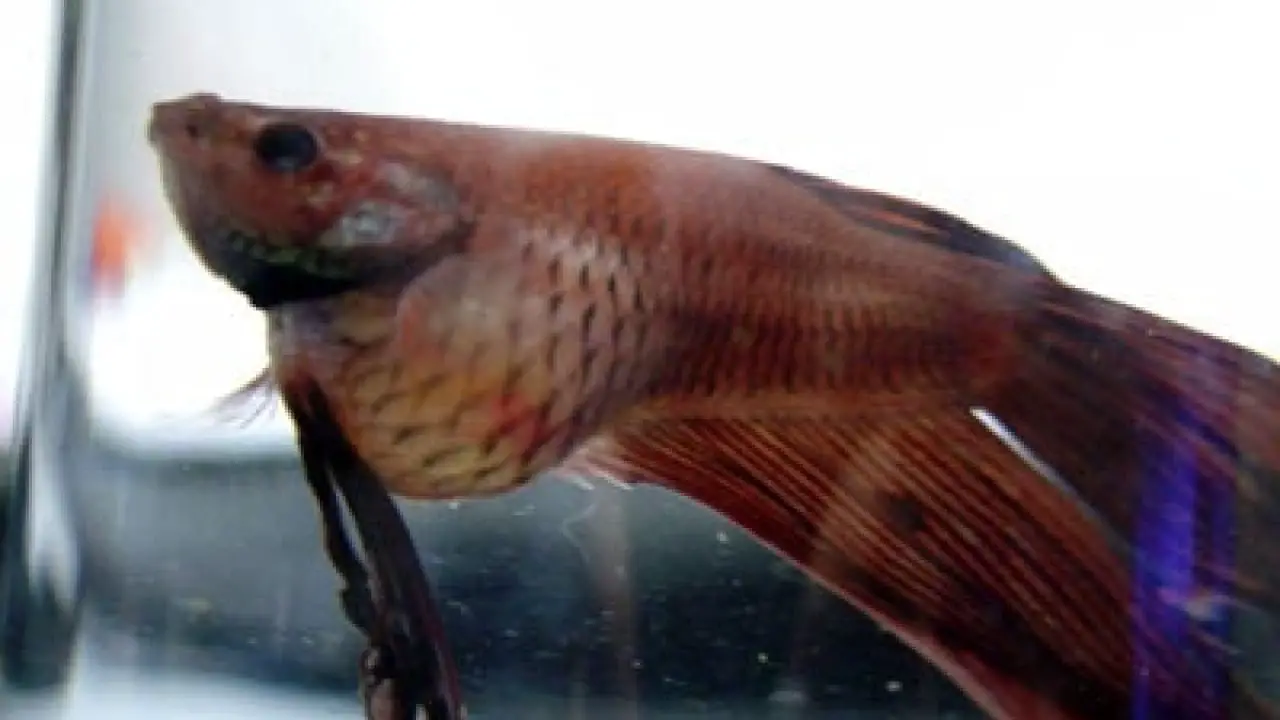If you’re a proud owner of a Betta fish, you know how captivating these creatures can be. But what if you notice that your Betta fish’s belly is getting bigger? Don’t panic just yet! In this article, we’ll explore the reasons why your Betta fish’s belly may be bulging and what you can do to ensure your fish’s health.
Whether you’re a seasoned Betta fish owner or new to the world of fishkeeping, understanding your Betta fish’s behavior and health is important. A swollen belly in Betta fish can be a sign of various issues, from overfeeding to serious health problems. Keep reading to learn more about why your Betta fish’s belly might be big and what you can do to remedy the situation.

Why Is My Betta Fish’s Belly Big? Here’s What to Know
Betta fish, also known as Siamese fighting fish, are popular pets because of their striking colors and unique personalities. However, if you notice that your betta’s belly is getting bigger, it may be a cause for concern. A swollen belly can indicate a variety of health issues, from constipation to tumors. In this article, we’ll explore the possible reasons why your betta’s belly is big and what you can do about it.
Overfeeding
Overfeeding is the most common reason for a betta fish’s big belly. Betta fish have a small stomach, and their digestive system is not equipped to handle large amounts of food. If you’re feeding your betta more than they can handle, their stomach will become distended, leading to a big belly.
To avoid overfeeding your betta, it’s important to feed them the right amount of food. A good rule of thumb is to feed your betta no more than what they can eat in two minutes, twice a day. You can also try feeding them smaller meals throughout the day. If you’ve been overfeeding your betta, cut back on the amount of food you give them and monitor their belly size.
Constipation
Constipation is another common reason for a betta fish’s big belly. This can happen if your betta is not getting enough fiber in their diet or if they are eating too much dry food. Constipation can cause your betta’s stomach to swell and become uncomfortable.
To prevent constipation, make sure your betta is getting enough fiber in their diet. You can do this by feeding them a variety of foods, including live or frozen foods like brine shrimp or bloodworms, and supplementing their diet with vegetables like peas. You can also soak their dry food in water before feeding it to them to help prevent constipation.
Egg-Bound Females
If you have a female betta fish, a big belly can indicate that she is egg-bound. This means that she has eggs that are stuck in her body and cannot be released. Egg-binding can be a serious condition that requires immediate attention.
If you suspect that your female betta is egg-bound, you should take her to a veterinarian who specializes in fish. The vet may be able to manually remove the eggs or prescribe medication to help your betta pass them. It’s important to address this issue as soon as possible to avoid further complications.
Tumors
In rare cases, a big belly in a betta fish can indicate the presence of a tumor. Tumors can be benign or malignant, and they can grow rapidly, causing discomfort and even death. If you notice that your betta’s belly is getting bigger and they are showing other signs of illness, such as lethargy or loss of appetite, it’s important to take them to a veterinarian for a diagnosis.
Other Possible Causes
In addition to the reasons listed above, there are other possible causes of a betta fish’s big belly. These include bacterial or parasitic infections, organ failure, and swim bladder disorder. If you suspect that your betta is suffering from any of these conditions, it’s important to seek medical attention right away.
The Benefits of a Healthy Betta Fish
Keeping your betta fish healthy is important not only for their well-being but also for your enjoyment of them as a pet. A healthy betta fish will be more active and vibrant, with bright colors and a playful personality. By providing your betta with proper care and nutrition, you can ensure that they live a long and happy life.
Betta Fish vs Other Fish
Betta fish are unique pets because of their colorful appearance and individual personalities. Unlike other fish, bettas can be kept in small tanks or bowls, making them a popular choice for people who live in apartments or have limited space. Betta fish are also relatively low-maintenance and easy to care for, making them a good choice for first-time fish owners.
In Conclusion
If you notice that your betta fish’s belly is getting bigger, it’s important to take action right away. By identifying the cause of your betta’s big belly and taking steps to address it, you can help your fish stay healthy and happy. Remember to feed your betta the right amount of food, provide them with a varied diet, and seek medical attention if necessary. With proper care and attention, your betta fish can live a long and fulfilling life.
Freequently Asked Questions
Betta fish are popular for their vibrant colors and easy maintenance. However, owners often find themselves wondering why their betta’s belly is big. Here are some frequently asked questions and answers to help you understand why your betta fish’s belly is big.
Why is my betta fish’s belly big?
A big belly in a betta fish can indicate several things. It could be a sign of overfeeding, constipation, or even a disease. Overfeeding is a common cause of a big belly in betta fish. Betta fish have small stomachs and can only eat small amounts of food. If you feed your betta fish more than they need, the excess food will accumulate in their stomach, causing their belly to swell. Constipation can also cause a betta fish’s belly to appear big. If a betta fish is constipated, their digestive system is not functioning properly, and food can get stuck in their stomach, causing bloating. Lastly, a big belly can also indicate a disease such as dropsy. Dropsy is a severe condition where a betta fish’s body swells due to fluid buildup.
If you notice that your betta fish’s belly is big, it’s essential to monitor their behavior and overall health. Overfeeding can be easily fixed by reducing the amount of food you give them. Constipation can be treated by feeding your fish a diet rich in fiber and avoiding overfeeding. However, if you notice other symptoms such as lethargy or loss of appetite, take your fish to a veterinarian for a diagnosis and treatment.
How much should I feed my betta fish?
Betta fish have small stomachs and can only eat small amounts of food. Overfeeding can lead to a big belly and other health problems. A good rule of thumb is to feed your betta fish two to four pellets a day, depending on their size. It’s best to feed them small amounts multiple times a day rather than one large meal. You can also incorporate treats such as freeze-dried bloodworms or brine shrimp into their diet, but these should be given sparingly.
It’s important to observe your betta fish’s behavior and adjust their feeding accordingly. If you notice that they are not finishing their food or their belly is getting bigger, reduce the amount of food you give them. On the other hand, if they seem hungry and are actively searching for food, you can increase the amount slightly. Remember, a well-balanced diet and proper feeding schedule are essential for a happy and healthy betta fish.
Can I fast my betta fish to treat bloating?
Fasting is a common practice used to treat bloating in betta fish. When a betta fish is fasted, their digestive system has time to rest and clear any blockages. However, fasting should only be done for a short period, typically 24-48 hours. Fasting for an extended period can cause your betta fish to become weak and malnourished.
If your betta fish is constipated or bloated, you can fast them for 24-48 hours and then feed them a diet rich in fiber, such as daphnia, brine shrimp, or boiled peas. It’s important to monitor their behavior and overall health during this time. If you notice any other symptoms or your fish is not improving, take them to a veterinarian for a diagnosis and treatment.
What are the symptoms of dropsy in betta fish?
Dropsy is a severe condition that can affect betta fish. It’s characterized by a swollen belly, raised scales, and a pinecone-like appearance. Dropsy is caused by an internal bacterial infection that affects the fish’s organs and can be fatal if not treated promptly.
In addition to a swollen belly and raised scales, other symptoms of dropsy in betta fish include lethargy, loss of appetite, and difficulty swimming. If you notice any of these symptoms in your betta fish, it’s essential to take them to a veterinarian for a diagnosis and treatment. Dropsy can be treated with antibiotics and supportive care, but early detection is crucial for the best chance of recovery.
How can I prevent my betta fish from getting constipated?
Constipation is a common problem in betta fish that can lead to a big belly and other health problems. Fortunately, there are several things you can do to prevent your betta fish from getting constipated. First, make sure you are feeding them a well-balanced diet that is high in fiber. Foods such as daphnia, brine shrimp, and boiled peas can help promote digestion and prevent constipation.
Second, avoid overfeeding your betta fish. Betta fish have small stomachs and can only eat small amounts of food. Overfeeding can lead to constipation and other health problems. A good rule of thumb is to feed your betta fish two to four pellets a day, depending on their size.
Lastly, make sure your betta fish’s tank is clean and well-maintained. A dirty tank can lead to stress and illness, which can contribute to constipation. Regular water changes and tank cleanings are essential for a healthy and happy betta fish.

What to do If my Betta Fish Is Bloated? (FIX Bloated Betta Fish Problem)
In conclusion, if you notice that your betta fish’s belly is big, it’s important to take action quickly. The most common cause of a big belly is overfeeding, so it’s important to adjust the amount of food you give your fish. Additionally, keeping the tank clean and providing a healthy diet can also help prevent this issue.
If you’ve ruled out overfeeding as the cause of your betta fish’s big belly, it’s possible that they may have a health issue. In this case, it’s best to seek advice from a veterinarian who specializes in fish. They can help diagnose the problem and recommend the best course of treatment.
Overall, keeping a close eye on your betta fish’s health and behavior is crucial for their wellbeing. By being aware of the signs of a big belly and taking swift action, you can help ensure that your fish remains healthy and happy for years to come.
